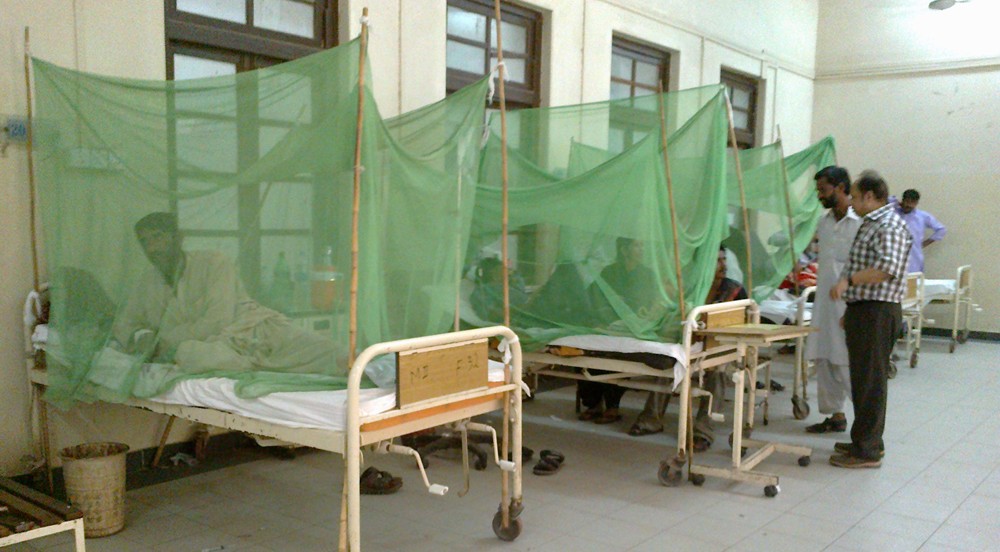
With no effective preventive measures in sight to prevent dengue in Karachi, the number of infected cases is on the rise

The dengue virus just refuses to go away. This year alone, more than 775 people in Karachi were affected by the mosquito-borne viral fever, out of which, 11 lost their lives -- and doctors fear that the death toll may rise in coming months.
Health officials in the metropolis attribute the rising cases of the virus to the season (from August to December) when the killer mosquito Aedes Aegypti --which carries the virus -- breeds in fresh waters. They say that the Sindh government is dealing with the menace the best it can.
"We have set-up dengue wards in all the government hospitals and the response has been good," says Shakeel Mullick, the head of Dengue Surveillance Cell Karachi.
Mullick says the Sindh health department has alerted the government and private hospitals to check patients for symptoms and conduct tests without delay.
Doctors are of the opinion that in almost all the cases that resulted in causality, the patients were either misdiagnosed or the virus was apprehended too late to take any remedial measures. The 11 cases in which the patients died proves the point -- as at least 7 of them were rushed to private hospitals when their condition deteriorated drastically.
The medical superintendent of Civil Hospital Karachi Dr Saeed Quraishy concedes that the idea of running a separate dengue ward in the hospital was not effective. Dr Quraishy adds that when dengue patients were kept away from the other wards, they were not being provided with adequate attention by senior doctors.
They have now kept the dengue patients with others, so the senior professors making rounds in the wards can keep an eye on them. Previously relatively young doctors were overseeing a separate dengue ward, but "We have now brought the dengue patients with others, so that senior medical practitioners can regularly check on their progress," he says.
Dr Quraishy says, the job of doctors begins when the patients show up at the hospital but dengue has to be contained in ways that fall beyond what doctors can do -- "The government should work on preventive measures, which is crucial because, unless we do that, people will continue to get infected".
Curbing dengue requires measures that are out of the healthcare administration’s purview. The government has to make holistic efforts on the preventive front to control it from spreading.
Urban centres like Karachi are relatively more vulnerable to the dengue virus as the carrier mosquito looks for fresh water to breed its larvae. And city houses and apartments provide the mosquito with ample space for such procreation. Last year, out of the 5750 dengue viral fever cases reported across Sindh, 5058 were detected in Karachi and 692 in the rest of Sindh province.
"The society has to come forward and help us fight the disease," says Dr. Zafar Ijaz, the executive district health officer (EDO) Karachi.
Dr Ijaz says that over the past few years, the Sindh government has learnt its lessons and spread awareness about the disease, which has resulted in better diagnosis and the government’s realisation that the health department alone cannot tackle the virus.
"We cannot go to every house in the city and clean their water tanks or ensure that their gardens are free from dengue larvae," he says, continuing that containing this virus requires a concerted effort, in which, government’s civic agencies along with the general public have to work.
However, the Sindh government’s lack of commitment on the preventive front is obvious. The provincial authorities or the city administration has yet not come up with a comprehensive map of dengue-infected areas of the city and initiate a rigorous fumigation campaign, which experts say, is the need of the hour. Health officials complain that unless such solid preventive measures are taken, the disease cannot be controlled.
The Karachi Metropolitan Corporation (KMC) is responsible for the fumigation but media reports suggest that it is reeling from lack of funds, which is delaying the fumigation drive.
The commissioner Karachi Shoaib Siddiqui was not available for comment.
Dr Ijaz says despite the number of deaths reported, the authorities have implemented an efficient testing and treatment mechanism in the city and it is bearing fruit. "Two years ago, we did not have a system in place to keep account of dengue cases, but this year, I believe, because of the awareness more and more people ask doctors to test them for dengue, which is a huge stride forward."